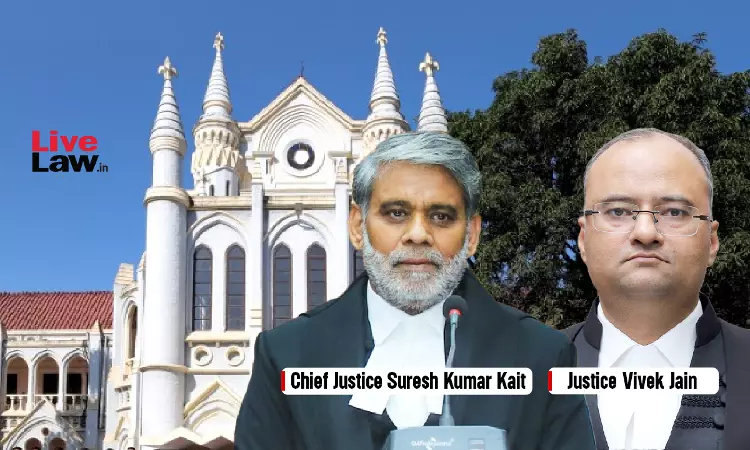- Home
- /
- Labour & Service
- /
- Irregularly Appointed Staff, If...
Irregularly Appointed Staff, If Confirmed, Can't Be Terminated Arbitrarily: MP High Court
Pranav Kumar
13 May 2025 6:00 PM IST
Madhya Pradesh High Court: A division bench consisting of Justice Suresh Kumar Kait and Chief Justice Vivek Jain, reinstated a university employee terminated after over 25 years of service. The court ruled that his appointment was merely irregular and not illegal, and that subsequent confirmation of service had regularised his post. The court held that confirmed employees cannot...
Madhya Pradesh High Court: A division bench consisting of Justice Suresh Kumar Kait and Chief Justice Vivek Jain, reinstated a university employee terminated after over 25 years of service. The court ruled that his appointment was merely irregular and not illegal, and that subsequent confirmation of service had regularised his post. The court held that confirmed employees cannot be terminated without proper inquiry, notwithstanding if the initial appointment was irregular.
Background
Narendra Tripathi was employed by Barkatullah University, Bhopal, since 1998. On 16 December 1998, Narendra Tripathi was appointed as a Project Officer, through a resolution passed by the University's Executive Council. The pay scale was fixed at Rs. 5500-9000/-. After over 25 years of service, he was confirmed in service via an order dated 30 May 2012. He was also given benefits of revised pay scales of the Sixth and Seventh Pay Commissions. Further, he also was granted financial incentives by the State government and was given permission to pursue his Ph.D. in 2017
However, on 21 Feb 2024, the University passed an order terminating his services. According to the termination order, Tripathi's initial appointment was termed illegal, as the University statutes were not followed while recruiting him. Further, the order noted that reservation rules were violated by his appointment.
The termination order was passed following a quo-warranto petition filed by one Bhagwan Rajput, challenging Tripathi's initial appointment. In that case, the University argued that Tripathi's appointment was not legal. Consequently, the court dismissed the petition, noting that no directions were necessary if the employer himself believed that the appointment was illegal. The University then promptly issued a termination order, without any show cause notice or opportunity to be heard.
Aggrieved, Tripathi filed a writ petition challenging this order. A single judge bench dismissed the petition, prompting him to file the present writ appeal.
Arguments
Narendra Tripathi argued that the termination order was arbitrary and illegal. He argued that after 25 years of service, he had acquired a right to remain employed. Relying on State of Karnataka v Uma Devi (Appeal (civil) 3595-3612 of 1999), he submitted that the confirmation he received in 2012 had regularised the irregularities in his initial appointment (if any). He further argued that as a confirmed employee, he couldn't be terminated without following Clause 57(3) of Statute 31 of the University read with Rule 14 of M.P. Civil Services C.C.A. Rule, 1966 – clauses which mandated a regular enquiry before termination.
The University argued that Tripathi's appointment was illegal from the beginning, and therefore, is void ab initio. Relying on the Division Bench judgment in Mansukh Lal Saraf vs. Arun Kumar Tiwari (Writ Petition No.198/1999), they argued that no rights can be vested in an employee if the initial recruitment itself was illegal. The University argued that Tripathi was only initially appointed on a "temporary basis till further order". They argued that the post of Project Officer was only vacant due to the death of one Ms. Elawadi, which was already filled by one Dr. Thakur. Thus, the University argued that no vacancy existed when Tripathi was appointed.
Court's Reasoning
Firstly, the court note that Tripathi had served for over 25 years and was now over-age for any alternative employment. The court also noted that there was no allegation of misconduct against him until now, and the only ground for termination is the allege illegality of his appointment.
Secondly, the court held that University's approach was discriminatory. The court pointed put that while Tripathi was singled out and fired, no action was taken against the other 48 employees who were named in the same termination order. The court explained that despite initiating inquiry against 163 employees, the University only completed Tripathi's enquiry; everyone else was allowed to complete their service and receive pensions.
Thirdly, the court held that Tripathi's appointment was only irregular, and not illegal. Citing Uma Devi and a State Government circular dated 08.02.2008, the court held that for appointments made against sanctioned posts without following proper processes are only "irregular" and can be regularized. The court noted that only appointments without available posts are termed "illegal".
Fourthly, the court held that the confirmation received by Tripathi after 14 years of service in 2012, had regularised any irregularity in his initial appointment. Pursuant to this regularisation, the court deemed Tripathi's termination after 25 years to be illegal. The court held that as a 'confirmed employee', he could only be terminated over allegations of misconduct and after proper departmental procedures.
Thus, the court allowed the appeal. It directed that Tripathi receive 50% back wages from the date of dismissal of the writ petition till the date of this order, and full wages thereafter.
Decided on: 07.05.2025
Case No.: W.A. 1610 of 2024
Counsel for the Appellant: Shri L. C. Patne, Shri Abhay Pandey, Shri Siddharth Saroha and Shri Akash
Counsel for the Respondents: Shri Prashant Singh (Advocate General) and Shri Amit Seth (Additional Advocate General) assisted by Shri Sahil Sonkusale for the State, University and Vice Chancellor; Shri Ved Prakash Tiwari for the Executive Council of the University



